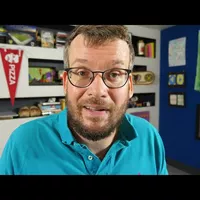11 Great Books You Probably Haven't Read
Ah my bookshelves are so disorganized, must re-catalog soon.
But there's no time because Pizzamas starts in 6 days. Good morning
Hank, it's Tuesday. Let's talk about books.
Specifically some great books you probably haven't read,
beginning with some fiction. Want to spend some peaceful
hours enjoying a great mystery series? Crash Course
co-founder Stan Muller introduced me to Ann Swinfen's
novels, this book the Bookseller's Tale is the first in my favorite series.
It's set in Oxford in 1353 and the world of Medieval book
making is just such a great backdrop. If you want to belly laugh and
be truly astonished by linguistic acrobatics I recommend Tuff by
Paul Beatty. Beatty is more famous for his book The White Boy
Shuffle and the Booker Award Winning The Sellout. But I first
read this book 20 years ago and I've been thinking about it ever since.
A book that makes me both sob and feel hopeful? Jacqueline
Woodson's Miracle Boys. This novel is ostensibly for kids 10
and up, and I know many kids who've loved it, but I am a 44
year old person and I also love it. It's about impoverishment
and grief and surviving loss but above all it is about brothers and
Hank, as you know, I love a book about brotherhood and
this one might be my favorite. Ok, onto infectious disease
because that's where my brain always goes. I really love the book
the Black Death by Rosemary Horrox. It's a collection of first person
accounts of the 4 year period in which approximately half of all
Europeans died of plague. Another disease book I love is
Frank Snowden's Epidemics and Society. It helped me understand
that disease has always been one of the most important historical
forces. Like we think about Alexander the Great and Cleopatra
and whatever, but it's mostly microbes. And the book also explores how
racism and other forms of discrimination shapes disease burden,
which in turn shapes history. It's a reminder that disease does
not treat people equally unless society treats people equally.
A physics book: I love the Disordered Cosmos by Chanda
Prescod-Weinstein. This book taught me that we don't know why there is
matter in the universe. From which I have not recovered. It also helped
me understand the big bang and dark energy and lots of other stuff
even though I have like a 4th grade level of physics,
but it is also a book about gender identity and race and lots of other stuff.
It is just brilliant I have never read anything like it.
Another book that acknowledges that we are not like observers of
reality but participants in it: Phosphorescence by Julia Baird.
It is about living with cancer, and creatures that make their own
light, and the science of human joy, and it is so so good. Alright, a sports
book. I realize I'm biased here, but All Together Now by longtime
AFC Wimbledon CEO Erik Samuelson is so enjoyable.
I mean it is the greatest underdog sports story of all time, told by one of the
people who made it happen. Essays? I know Mary Oliver is
famous for her poems, but I love her essays, especially the ones
collected in Upstream. I dog-eared almost every page in this book but
one quote especially stuck with me: “I read the way a person might swim,
to save his or her life.” Speaking of that kind of reading: I love Pilgrim
Bell the new book of poems by Kaveh Akbar. He writes the kind
of poems that get richer and more interesting the more time
you spend with them. And in the last month I have read this
book over and over and it just keeps giving me new gifts.
Lastly, you have probably not read this 1945 cookbook, How
to Cook and Eat in Chinese by Buwei Yang Chao, a chinese physician
who emigrated to the United States in the 1920s. This book has been
out of print for decades but it is a wonderfully post-modern cookbook
like one of the first sentences is, “I did not write this book.” It is also
hugely historically important, it introduced many Americans to Chinese
cooking techniques and coined English language terms like stir-fry and
potstickers. And it is full of these piffy witticisms like “you know
how it is with modern daughters and mothers who think we are modern.”
Somebody put it back in print! What are some books that I
probably haven't read that you would recommend me? Let me
know in comments. Also, I made a Bookshop.org list with all of these
books if you're interested, plus a couple other recommendations
link in the dooblydoo below. Hank, I will see you on Friday
and then you will see me on Monday.

